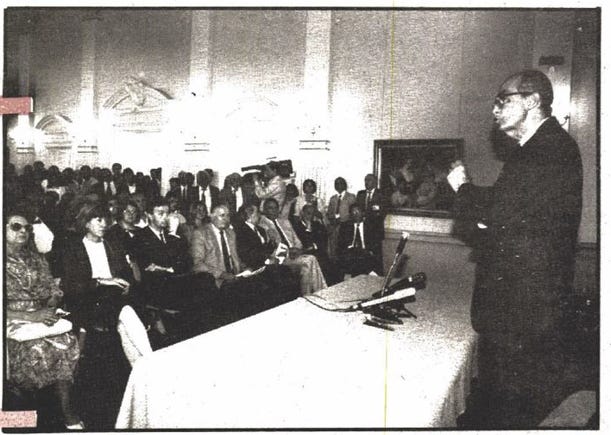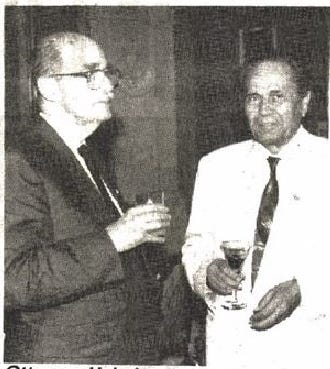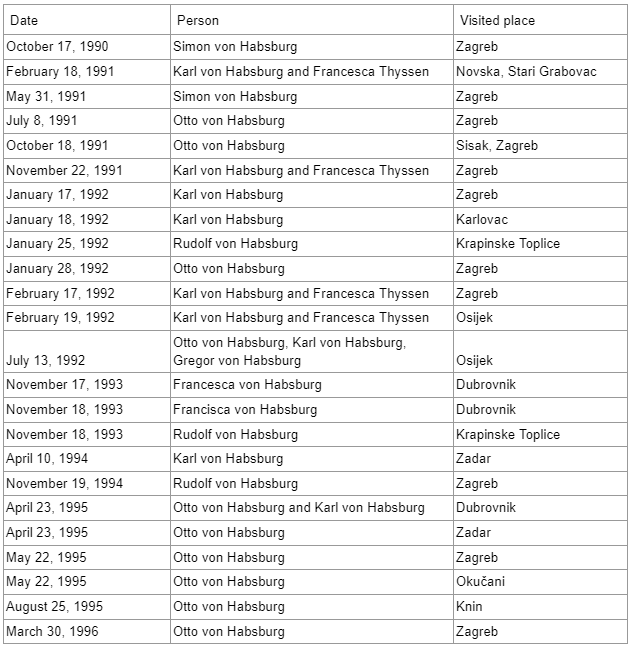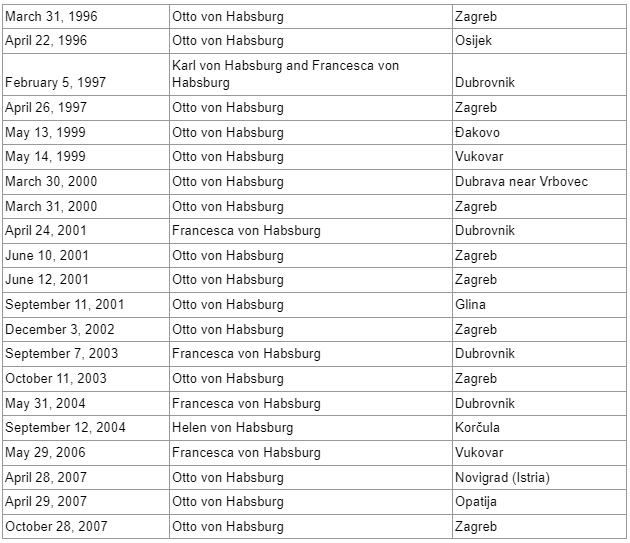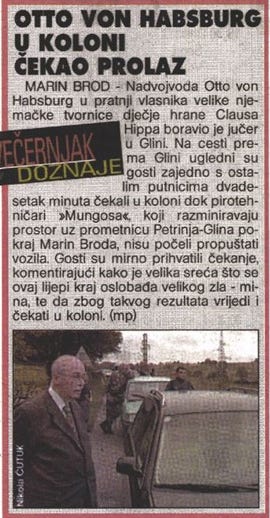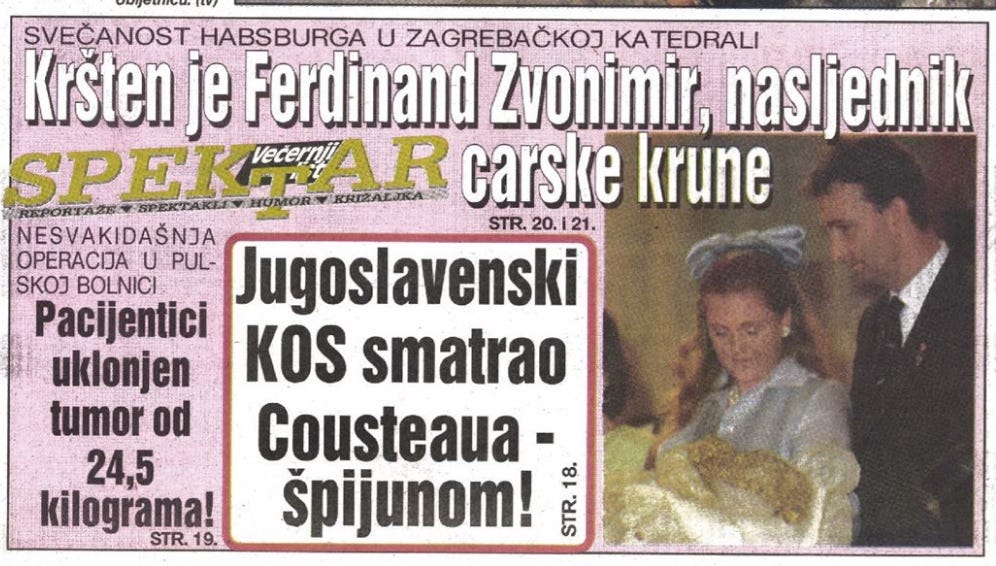Otto von Habsburg and his family in Croatian media after 1990
Unofficial ceremonial kings of Croatia.
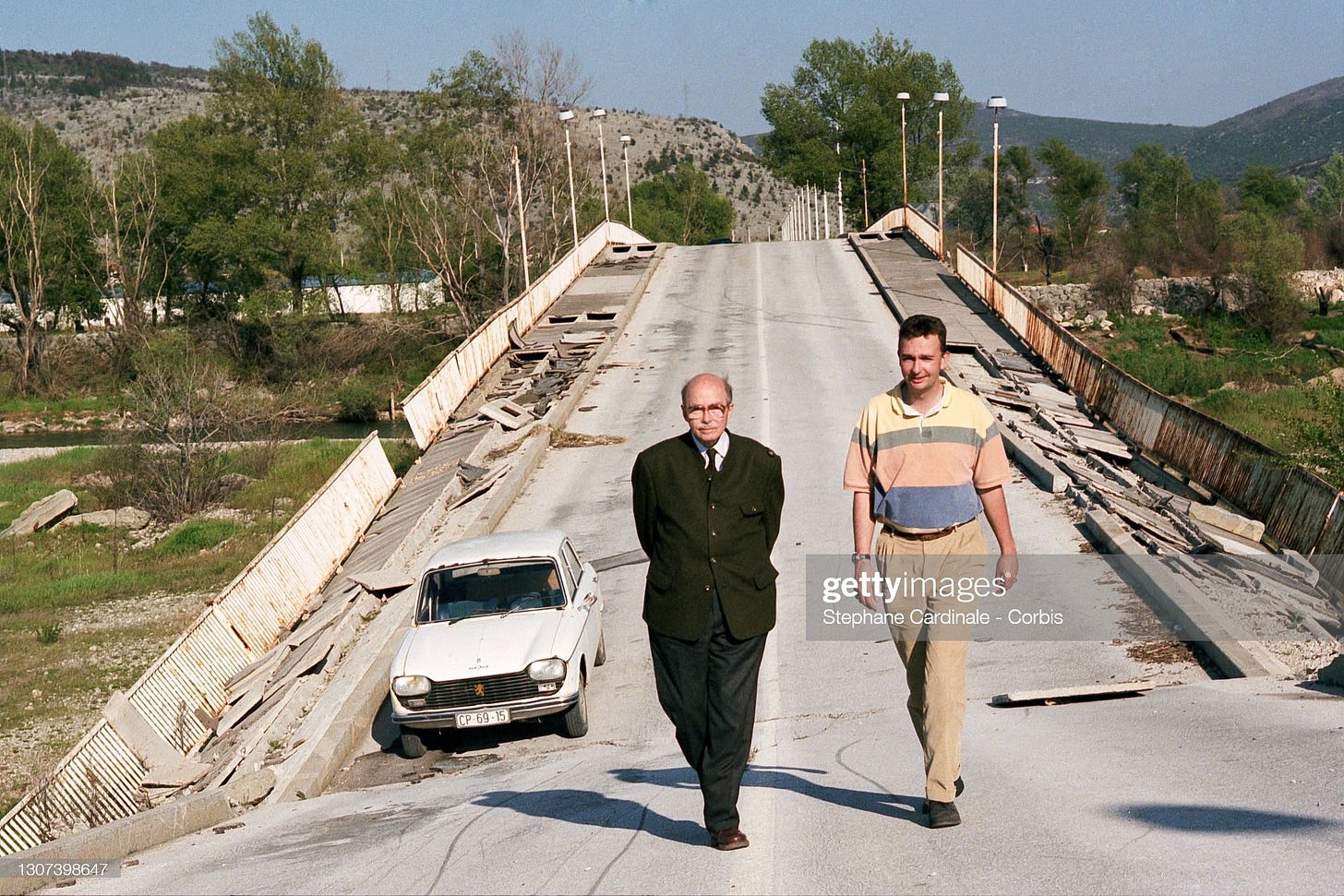
In addition to changing currencies, Croats also liked to change ruling dynasties and forms of government during the 20th century. We mostly just followed the latest European fashion, even when proclaiming independence 2-3 times. The Habsburgs were one of the ruling dynasties. In this article, we will focus on their portrayal in Croatian media after 1990, and the main character in the story is Otto von Habsburg. His son, Karl, found love during the war in Croatia, and that’s the love story that should keep you interested to read this whole thing.
Following the dissolution of the Austro-Hungarian Empire, Habsburgs lost their crown and were forced into exile, wandering throughout Europe. Otto von Habsburg (1912-2011), the last crown prince of Austria-Hungary, lived in a number of different countries, including Germany, Switzerland, Belgium, France, and Spain. He served as the Vice President of the International Paneuropean Union movement from 1957 to 1973 and as the President from 1973 to 2004. He was also a member of the European Parliament for the Christian Social Union of Bavaria (CSU) from 1979 to 1999. During his time in the European Parliament, Otto took a particular interest in the countries behind the Iron Curtain, even setting up an empty chair in the Parliament to symbolize their absence. He played a significant role in the revolutions of 1989, co-initiating the Pan-European Picnic, and later supported the EU membership of central and eastern European countries. Today he is described as one of the "architects of the European idea and of European integration" together with Robert Schuman, Konrad Adenauer, and Alcide De Gasperi.
To the reputational hell and back
But it wasn’t always like that. His pan-European ideas were often mocked. For a long period after World War II, his potential return to Austria was a political issue. The debate over his return even led to political infighting and civil unrest, creating a crisis for the country that later became known as the "Habsburg Crisis." Eventually, Otto was issued an Austrian passport in 1966 and was able to visit his home country for the first time in 48 years. In Hungary, the political administration of János Kádár kept an eye on his activities; his name was on a blacklist until the second half of the eighties. In 1987, after seven decades, he came back to Hungary as a private individual, with the close attention of the Ministry of the Interior. During socialist Yugoslavia, the Habsburgs were largely ignored, except for the occasional criticism of Otto von Habsburg's activities in the press, a topic which will be discussed in another article. For Slavic nations, Habsburgs were definitely not "flowers," and Croats also like to hold grudges about the past, and it's not easy for them to forget that Otto’s ancestor decapitated Croatian nobility in 1671.
But the winds were changing and Croats were not the only ones that will suddenly consider Habsburgs as friends and allies. Some even offered them a crown, like the reestablished Hungarian Smallholders' Party in 1989. Otto declined but also stated that the very small possibility of Austro-Hungary restoration exists. Croatia was still in Yugoslavia, and its press mocked Otto’s statement: “In European socialist countries, Habsburg's visit to Budapest passed without excitement. It is good that the world of socialism also realized that uncrowned emperors are rarities of the past and only media stars who have not and cannot change systems, least of all state borders, for a long time,” wrote Večernji list on May 15, 1989.
But not even a year after, on March 3, 1990, Večernji list described Otto as "a reputable political scientist and politician ... author of notable political and historical texts". The newspaper also noted that Hungarians don’t give up. One political party wants him to be a king, and another to be a president. Some in Croatia were still skeptical, but already from the nationalist, not communist point of view: “In this time of loss of historical memory, some Croats are also flirting with the Habsburgs. While the monument to Josip Jelačić, Croatian ban, and executioner of the Hungarian rebellion of 1848, is being pompously returned to Zagreb's main square, old Otto Habsburg was recently a guest to Coalition of National Accord in Munich. In order for this tragicomedy to be complete, old Otto, climbing the podium to greet "his Croats," tripped and fell. ... The intoxication of historical myths is apparently strong, as is that of wine. It is encouraged by invisible conductors of new divisions and alliances...” (Večernji list, April 24th, 1990). Nevertheless, Otto soon visited Croatia for the first time, and newspapers reported that he gave a lecture about European integrations on June 30 1990 to a large audience.
As Yugoslavia began to fall apart, public opinion in Croatia changed significantly about a lot of things, including the view of the contemporary Habsburgs. Their legacy in Croatia is somewhat ambivalent. The Habsburg regimes in Croatia, though sometimes oppressive and even severe to the point of beheading those who opposed them, also brought about periods of economic and cultural development and maintained order. So there was also some element of nostalgia. Instead of being ignored, Otto and the other Habsburgs were now highly valuable allies and good friends to have. In fact, they did a lot of work to help Croatia and lobby on its behalf, and Croatian media covered everything about those activities. There was definitely some escapism the readers got from this coverage. The presence of royalty in Croatia during the war brought a touch of glamour to those hard times, including even a love story. They were also great role models for the youth because, unlike two other dynasties whose members were de facto or de iure kings of the Croats in the 20th century, the contemporary Habsburgs at least did not have problems with alcohol. I raise a toast to that.
Habsburgs in Croatia and about Croatia
After the initial visit from Otto, Habsburgs became regular guests in Croatia, especially during the war. They made a special connection with some places. Karl was often in Karlovac, the city named after its founder, Karl’s ancestor Karl II. Franz von Innerösterreich. Francesca was regular in Dubrovnik. They brought donations, visited the wounded people, and warned about the damage to the cultural heritage. After the war, they continued to visit, gave lecures promoting European integration, helped restorations, sponsored art, but also promoted jet-set tourism. It would be tedious to describe every Habsburg visit to Croatia, so the following table compiled from articles published in the Croatian newspaper Večernji list provides a good summary (column Date is the Večernji list’s issue date).
Večernji list regularly reported about Habsburg family activities abroad, especially when it was concerning Croatia. Here is the table of Otto’s activities Večernji list mentioned.
According to Croatian media, the Habsburgs were “the truth-bearers” during the war. Otto is “would-be king, our friend”. He is “the friend in the trouble” and “a successful visionary” (Večernji list, April 1, 1996 - no, it’s not a fool’s day joke). We can also learn from reading a newspaper that Otto’s received Grand Order of King Dmitar Zvonimir with sash and Morning Star, which ranks fourth in the Croatian order of precedence. He meets with presidents Tuđman and Mesić. He is an honorary citizen of various cities. Whole pages are written about his visits. We know that he waits patiently in line on the border. When it was announced Otto will celebrate his 95th birthday in Banja Luka, we also learned what he likes to eat: “The archduke is very fond of our wines, especially Herzegovinian wines, and every time he comes to Sarajevo, of which he is an honorary citizen, he must go and eat ćevapi. He loves local food.”
The Alka
The Alka is a longstanding equestrian event held in the Croatian town of Sinj on the first Sunday of August. Historically, it has been held in honor of visiting rulers or other important figures. However, at the beginning of the 21st century, the Alka became politically charged as a manifestation of nationalist opposition to the government, particularly president Stipe Mesić. In 2002, government officials refused to attend the event and the president refused to sponsor the competition. On the other hand, the opposition leaders were there. But they were not in the middle of the attention. That role belonged to Karl and Francesca von Habsburg, who were almost treated as ceremonial rulers of Croatia - the winner of the Alka received a gift from Karl featuring both the Habsburg and Croatian coats of arms. President Mesić was a bit jealous at least, as he said “Habsburgs were paraded too much, which is not right because they never apologized for the decapitation of Zrinski and Frankopan” (Večernji list, August 22, 2002). Croats like to hold historical grudges.
The love story
Here is the promised love story, the reason why you are reading this article in the first place. Večernji list featured a two-page report on the wedding on February 2, 1993, referring to it as the "wedding of the century”. It reminds readers that the couple’s love “was born in the midst of the war in Croatia, under the thunder of shells for the biggest Chetnik offensive near Karlovac”. In another article, this time titled “The wedding of the century for the new Europe”, it’s triumphantly stated below the picture of the couple: “Whoever Croatia brings together, nothing can tear it apart!”.
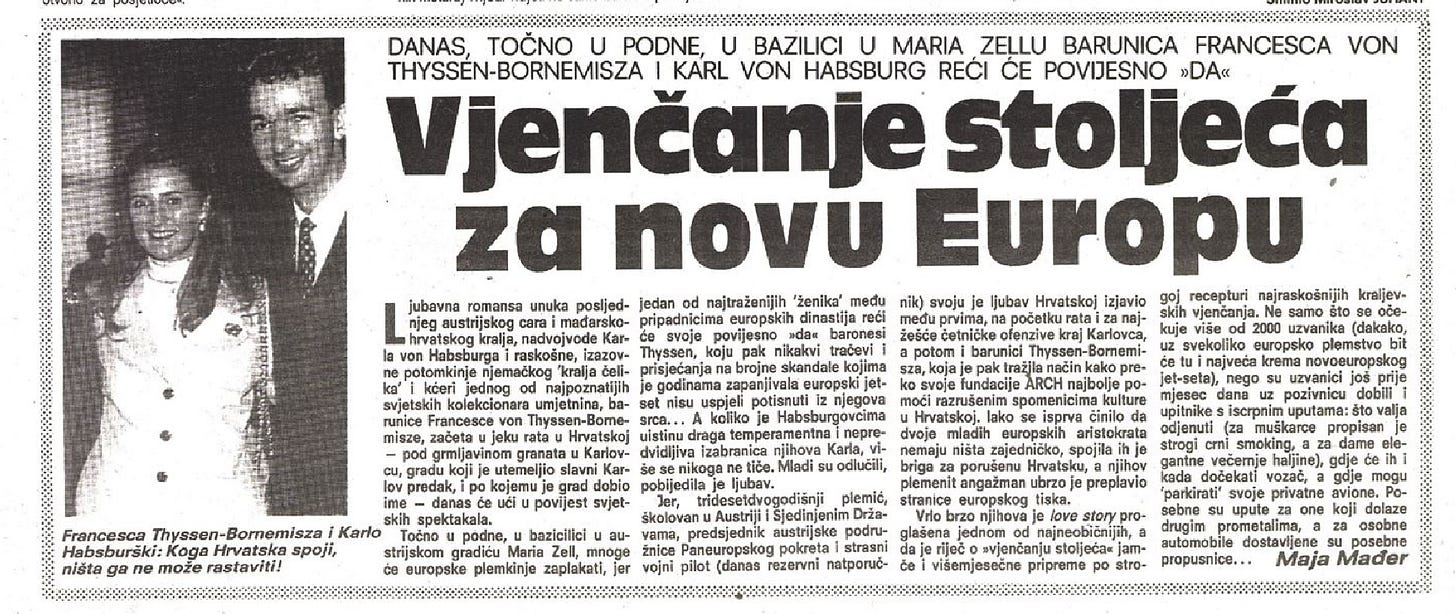
It seems it actually jinxed them. After 10 years of marriage, the couple separated in 2003. Finally, they divorced in 2017. But before that unfortunate ending, they made babies, Eleonore (b. 1994), Ferdinand Zvonimir (b. 1997), and Gloria (b. 1999). Ferdinand Zvonimir’s birth was especially covered by the press in Croatia. The child was baptized in the cathedral in Zagreb by Cardinal Franjo Kuharić, and Večernji list featured another two-page report. The boy was given the name Ferdinand Zvonimir. The choice of name is of course not accidental. Ferdinand was a Habsburg Archduke elected as a king of Croatia in 1527, and Zvonimir was a king of Dalmatia and Croatia from 1076 until 1089. Ferdinand Zvonimir is a motor racing driver. Maybe Mate Rimac should send him Nevera.
Conclusion
In the 1990s, the Habsburgs were a regular presence in Croatian media, with every step they took being covered by the press. They were almost treated as ceremonial kings of Croatia. They were also portrayed as friends and allies. Their numerous visits to the country and lobbying efforts support this perception.
I hope you like this text, the comments section is below.




